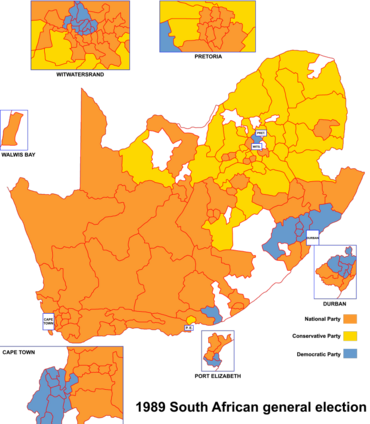Our website is made possible by displaying online advertisements to our visitors.
Please consider supporting us by disabling your ad blocker.
1989 South African general election
| ||||||||||||||||||||||||||||||||||||||||||||||||||||||||||||
166 of the 178 seats in the House of Assembly 84 seats needed for a majority | ||||||||||||||||||||||||||||||||||||||||||||||||||||||||||||
|---|---|---|---|---|---|---|---|---|---|---|---|---|---|---|---|---|---|---|---|---|---|---|---|---|---|---|---|---|---|---|---|---|---|---|---|---|---|---|---|---|---|---|---|---|---|---|---|---|---|---|---|---|---|---|---|---|---|---|---|---|
| Registered | 3,120,104 | |||||||||||||||||||||||||||||||||||||||||||||||||||||||||||
| Turnout | 69.48% ( | |||||||||||||||||||||||||||||||||||||||||||||||||||||||||||
| ||||||||||||||||||||||||||||||||||||||||||||||||||||||||||||
80 of the 85 seats in the House of Representatives 41 seats needed for a majority | ||||||||||||||||||||||||||||||||||||||||||||||||||||||||||||
| Turnout | 18.14% ( | |||||||||||||||||||||||||||||||||||||||||||||||||||||||||||
This lists parties that won seats. See the complete results below. | ||||||||||||||||||||||||||||||||||||||||||||||||||||||||||||
40 of the 45 seats in the House of Delegates 21 seats needed for a majority | ||||||||||||||||||||||||||||||||||||||||||||||||||||||||||||
| Turnout | 23.29% ( | |||||||||||||||||||||||||||||||||||||||||||||||||||||||||||
This lists parties that won seats. See the complete results below.
| ||||||||||||||||||||||||||||||||||||||||||||||||||||||||||||
| This article is part of a series on the |
| Politics of South Africa |
|---|
 |
|
|
General elections were held in South Africa on 6 September 1989, the last under apartheid. Snap elections had been called early (no election was required until 1992) by the recently elected head of the National Party (NP), F. W. de Klerk, who was in the process of replacing P. W. Botha as the country's president, and his expected program of reform to include further retreat from the policy of apartheid. The creation of the Conservative Party had realigned the NP as a moderate party, now almost certain to initiate negotiations with the black opposition, with liberal opposition (the PFP) openly seeking a new constitutional settlement on liberal democratic and federalist principles.
Although the National Party won a comfortable majority of seats (94 of 166) in the House of Assembly, the governing party suffered a setback and received only 48% of the popular vote, the first elections since 1961 in which the NP failed to win a majority of the vote. However, the first-past-the-post system, and a severely fractured opposition as well as the twelve appointed and indirectly elected members entrenched the NP's majority, allowing it to comfortably remain in power.
The Conservative Party (CP), which opposed any form of power-sharing with other races, failed to accomplish a breakthrough beyond its conservative Afrikaner backing as some had expected, but remained the official opposition with 39 seats. By some estimates, the party had received the backing of a slim majority of Afrikaners particularly in the Orange Free State, once the NP's heartland, but with very limited support among English-speaking voters.[1]
Before the elections, the liberal Progressive Federal Party (PFP) had dissolved itself and regrouped as the Democratic Party (DP), winning 33 seats, six seats short of retaking its position as the official opposition. In terms of vote share, it fell a quarter million votes behind the CP, but was favoured by its stronghold in the Cape Province and Natal.
Cite error: There are <ref group=lower-alpha> tags or {{efn}} templates on this page, but the references will not show without a {{reflist|group=lower-alpha}} template or {{notelist}} template (see the help page).
Previous Page Next Page
Suid-Afrikaanse algemene verkiesing van 1989 AF Elecciones generales de Sudáfrica de 1989 Spanish Élections générales sud-africaines de 1989 French 1989년 남아프리카 연방 총선거 Korean Zuid-Afrikaanse parlementsverkiezingen 1989 Dutch Alegeri legislative în Africa de Sud, 1989 Romanian Парламентские выборы в ЮАР (1989) Russian






